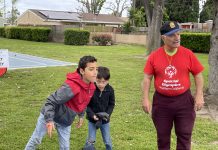As temperatures rise, so do the risks of heat stress. Extreme heat can be dangerous for anyone, especially seniors and kids. Excessive exposure to heat can quickly lead to serious illness as research shows summers are getting hotter over time. It’s important that our families stay safe while partaking in some of our favorite summer activities.
The best defense against heat stress and related illnesses is staying informed, prepared and alert. Here are a few tips to help stay active, healthy and safe when temperatures are high:
Know the signs.
Be alert for common signs of heat exhaustion, which include heavy sweating, paleness, muscle cramps, tiredness, weakness, dizziness, headache, nausea, vomiting and fainting. Seek medical attention right away if you notice any of these symptoms.
Stay hydrated.
Your body needs more water than you may think – and you need to drink before you are thirsty. Ask your doctor how much you should be drinking if you are directed to limit your fluid intake due to certain medications.
Skip the stove.
Cooking can heat up your living space quickly, so avoid turning on the stove or oven when it’s very hot. Cold foods like salad, fresh fruit and yogurt can be healthy, convenient and refreshing options when the mercury rises.
Time it right and take plenty of breaks.
Make the most of early morning and evening hours (before 11 a.m. and after 4 p.m.) when temperatures are cooler to do outdoor activities such as gardening or walking. Take regular breaks from the heat in air-conditioned areas or designated cooling centers, if necessary.
Take it inside. Don’t let the heat keep you sedentary. Studies have shown walking more and sitting less may help people maintain a healthier weight, ward off depression and prevent serious health issues like heart disease. When it’s too hot for your usual outdoor jog or bike ride, explore indoor-based activities at the gym or your community center.
Do get outside (safely): Recent research has found that some people spend 90 percent of their time indoors, limiting exposure to daylight and fresh air. Get outside to gain the benefits of being outdoors, but remember to wear sunglasses, as well as apply sunscreen to help reduce the risk of skin cancer.
Use the buddy system. If you choose to do an outdoor activity when it’s hot, bring a friend. Besides enjoying each other’s company, you can help each other stay alert to any signs of heat stress or get help if necessary.
Most importantly— stop if you don’t feel well. If you do start to have some warning signs of heat- related illness, seek medical assistance. You can also find additional health and wellness information and tips for healthy living at newsroom.uhc.com.
Sandra Crews is a wellness director for UnitedHealthcare












